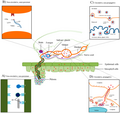Plant virus
Plant viruses are pathogens that affect plants, causing diseases that can lead to reduced yield and quality in a wide range of crops. Plant viruses are composed of nucleic acids, either DNA or RNA, surrounded by a protein coat. Unlike many other types of viruses, plant viruses are obligate parasites, meaning they require a living host (a plant) to multiply and cause disease. They can be transmitted in a variety of ways, including through insect vectors, seed transmission, mechanical transmission via damaged plant tissues, and through soil.
Transmission
The transmission of plant viruses is a critical aspect of their life cycle and epidemiology. The most common vectors are insects, such as aphids, whiteflies, and thrips, which feed on plant sap and inadvertently transfer viruses from infected to healthy plants. Some viruses can also be transmitted through seeds, making them particularly difficult to control as the virus can be present in the next generation of plants. Mechanical transmission occurs when the virus is spread through the use of contaminated tools or by the handling of plants. Soil-borne viruses can infect plants through their root systems.
Symptoms
Symptoms of plant virus infections can vary widely but often include mosaic patterns on the leaves, leaf curling, yellowing, stunted growth, and reduced yields. The specific symptoms depend on the virus, the plant species, and environmental conditions. Early detection and identification of plant viruses are crucial for managing and controlling outbreaks.
Management
Management of plant viruses focuses on prevention and control as there are no cures for viral infections in plants. Strategies include the use of virus-free seeds and planting material, control of insect vectors through the use of insecticides or biological control agents, and the removal and destruction of infected plants. Crop rotation and the use of resistant plant varieties are also effective management strategies.
Economic Impact
Plant viruses can have a significant economic impact on agriculture, affecting both yield and quality of crops. Losses can be particularly severe in developing countries where access to management strategies and resistant varieties may be limited. The global movement of plants and plant products also poses a risk for the spread of plant viruses, highlighting the importance of quarantine measures and international cooperation in managing these pathogens.
Research
Research on plant viruses includes the study of their structure, genetics, life cycle, and interactions with host plants and vectors. This research is critical for developing new and improved methods for managing plant viruses, including the development of resistant plant varieties and more effective control strategies for insect vectors.
Plant_virus
Transform your life with W8MD's budget GLP-1 injections from $125.
W8MD offers a medical weight loss program to lose weight in Philadelphia. Our physician-supervised medical weight loss provides:
- Most insurances accepted or discounted self-pay rates. We will obtain insurance prior authorizations if needed.
- Generic GLP1 weight loss injections from $125 for the starting dose.
- Also offer prescription weight loss medications including Phentermine, Qsymia, Diethylpropion, Contrave etc.
NYC weight loss doctor appointments
Start your NYC weight loss journey today at our NYC medical weight loss and Philadelphia medical weight loss clinics.
- Call 718-946-5500 to lose weight in NYC or for medical weight loss in Philadelphia 215-676-2334.
- Tags:NYC medical weight loss, Philadelphia lose weight Zepbound NYC, Budget GLP1 weight loss injections, Wegovy Philadelphia, Wegovy NYC, Philadelphia medical weight loss, Brookly weight loss and Wegovy NYC
|
WikiMD's Wellness Encyclopedia |
| Let Food Be Thy Medicine Medicine Thy Food - Hippocrates |
Medical Disclaimer: WikiMD is not a substitute for professional medical advice. The information on WikiMD is provided as an information resource only, may be incorrect, outdated or misleading, and is not to be used or relied on for any diagnostic or treatment purposes. Please consult your health care provider before making any healthcare decisions or for guidance about a specific medical condition. WikiMD expressly disclaims responsibility, and shall have no liability, for any damages, loss, injury, or liability whatsoever suffered as a result of your reliance on the information contained in this site. By visiting this site you agree to the foregoing terms and conditions, which may from time to time be changed or supplemented by WikiMD. If you do not agree to the foregoing terms and conditions, you should not enter or use this site. See full disclaimer.
Credits:Most images are courtesy of Wikimedia commons, and templates, categories Wikipedia, licensed under CC BY SA or similar.
Contributors: Prab R. Tumpati, MD







